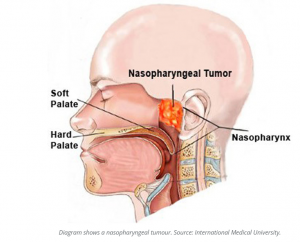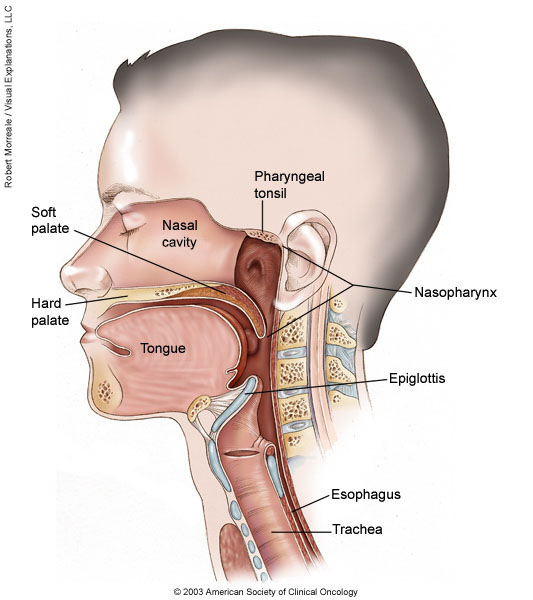Overview
Nasopharyngeal carcinoma is a cancer that occurs in the nasopharynx, which is located behind the nose and above the back of the throat. Nasopharyngeal carcinoma is rare in the United States. It occurs much more frequently in other parts of the world, specifically in Southeast Asia.
Nasopharyngeal carcinoma is difficult to detect early. This is probably because the nasopharynx is not easy to examine and the symptoms of nasopharyngeal carcinoma are similar to other more common conditions. Treatment for nasopharyngeal carcinoma usually involves radiation therapy, chemotherapy, or a combination of the two. You can work with your doctor to determine the exact approach for your particular situation.
Symptoms
In its early stages, nasopharyngeal carcinoma may not cause any symptoms. Possible notable symptoms of nasopharyngeal carcinoma include:
- A lump in the neck caused by a swollen lymph node
- blood in your saliva
- Bloody discharge from the nose
- Nasal congestion or ringing in the ears
- Hearing loss
- Frequent ear infections
- Throat pain
- Headaches
When to see a doctor
Early symptoms of nasopharyngeal carcinoma may not always prompt you to see your doctor. However, if you notice unusual and persistent changes in your body that don’t seem right to you, such as unusual nasal congestion, see your doctor.
Causes
Cancer begins when one or more gene mutations cause normal cells to grow out of control, invade surrounding structures, and eventually spread (metastasize) to other parts of the body. In nasopharyngeal carcinomas, this process begins in the squamous cells that line the surface of the nasopharynx.
It is not known exactly what causes the genetic mutations that lead to nasopharyngeal carcinoma, although factors, such as the Epstein-Barr virus, have been identified that increase the risk of this cancer. However, it is not clear why some people with all risk factors never develop cancer, while others with no apparent risk factors do.
Risk factor’s
Researchers have identified some factors that seem to increase the risk of developing nasopharyngeal carcinoma, including:
- Sex. Nasopharyngeal carcinoma is more common in men than in women.
- Race. This type of cancer most commonly affects people in parts of China, Southeast Asia, and North Africa. In the United States, Asian immigrants have a higher risk of this type of cancer than Asians born in the United States. Alaskan Eskimos are also at increased risk of nasopharyngeal cancer.
- Years. Nasopharyngeal cancer can occur at any age, but it is most often diagnosed in adults between the ages of 30 and 50.
- Salt-cured foods. Chemicals released in the steam when cooking salt-cured foods, such as canned fish and vegetables, can enter the nasal cavity, increasing the risk of nasopharyngeal carcinoma. Being exposed to these chemicals at a young age can further increase the risk.
- Epstein Barr virus. This common virus usually produces mild signs and symptoms, like those of a cold. It can sometimes cause infectious mononucleosis. The Epstein-Barr virus is also linked to several rare cancers, including nasopharyngeal carcinoma.
- Family history. Having a relative with nasopharyngeal carcinoma increases the risk of developing the disease.
- Alcohol and tobacco. Excessive alcohol consumption and tobacco use can increase the risk of developing nasopharyngeal carcinoma.

Complications
Complications of nasopharyngeal carcinoma can include:
- Cancer that grows to invade nearby structures. Advanced nasopharyngeal carcinoma can cause complications if it grows large enough to invade nearby structures, such as the throat, bones, and brain.
- Cancer has spread to other areas of the body. Nasopharyngeal carcinoma often spreads (metastasizes) beyond the nasopharynx.
Most people with nasopharyngeal carcinoma have regional metastases. This means that cancer cells from the original tumour have migrated to nearby areas, such as the lymph nodes in the neck. Cancer cells that spread to other areas of the body (distant metastases) most often travel to the bones, lungs, and liver.
Prevention
There is no sure way to prevent nasopharyngeal carcinoma. However, if you are concerned about your risk of nasopharyngeal carcinoma, you may want to consider avoiding habits that have been associated with the disease. For example, you can choose to reduce the amount of salt-cured foods you eat or avoid these foods altogether.
Tests to detect nasopharyngeal carcinoma
In the United States and other areas where the disease is rare, routine screening for nasopharyngeal carcinoma is not done. But in areas of the world where nasopharyngeal carcinoma is much more common—for example, in some areas of China—doctors may offer screening to people thought to be at high risk for the disease. Screening may include blood tests for the Epstein-Barr virus.

